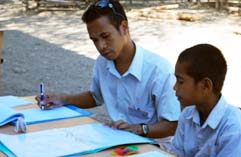 |
| With new learning materials, children are more interested to come to school as learning becomes more enjoyable. |
I’ve always been passionate about the need to focus on education in order to achieve lasting development and this is especially true in Timor-Leste, a country with one of the youngest and fastest growing populations in the world. I visited a number of schools around the country to see the benefits of two of the World Bank’s projects in the education sector: the Fast Track Initiative Bridging Project 2009 and the Education Sector Support Project, co-funded by AusAID.
There has been real change in the education sector since the country achieved independence in 2002. Enrolment figures in primary education increased from around 50% to almost 90% in 2010, combined recently with rapid reductions in primary school dropout rates. However, with this success come new challenges and opportunities. In any country education is not just a question of getting kids in school. It is about ensuring that all children are able to build skills and knowledge, and ultimately access increased opportunities as a result of what they learn. This is why the World Bank is now increasingly focusing on the quality of education in Timor-Leste.
As I visited schools that have benefitted from the projects, one thing that struck me is that these classrooms are vibrant, and stimulating. Cards decorate the walls featuring common words in both Tetum and Portuguese, the country’s two official languages; alphabet cards align the tables; children practice handwriting on blackboards and refer to bilingual number, shape and color cards; teachers throw alphabet dice to help children recognize the letters, and the students read picture story books with illustrations from local artists. Every school has been provided with 148 reading books containing basic words to ensure that Timorese children have access to appropriate Timorese resources to help them learn to read and write.
During my visit to a school in Liquiça, I spoke to Adelina Mendonça, who started teaching in 2000.
“There were lots of problems such as no proper school buildings, no tables, no chairs, no books. In 2002, things began to improve as the government and international organizations started to pay attention to schools. In 2009 the World Bank supported new learning tools and materials. The learning materials help us teachers a lot. I find it easier to teach the children and they are keen to come to school. They all look happy and feel like they are coming to school to have fun through all the games and the singing. At the same time it helps them understand maths, reading and writing.”
 |
| Assessing students’ basic mathematic skills to measure current progress and plan future learning outcomes. |
One critical way of both measuring the effectiveness of these learning materials and ensuring that education is helping the children of Timor-Leste build such skills is through the Early Grade Reading and Mathematics Assessments (EGRA and EGMA). Timor-Leste is the first country in the East Asia Pacific to undertake EGMA, a breakthrough diagnostic of numeracy as a basis to improve learning outcomes.
For two and a half weeks in July, seven teams of four assessors talked to nearly 1,300 children in 68 schools, travelling between central and very remote parts of the country to see how well children in Timor-Leste are able to count and perform basic sums. Once the results are in, EGMA will assist the Ministry of Education in measuring progress in the quality of learning in schools and tailoring teacher training to maximize learning.
Education is one of the most powerful drivers of development and it is also an equalizer, an important step in helping break the cycle of poverty between generations. In Timor-Leste, one of the pillars of the World Bank’s engagement is to support the government in providing more inclusive development. This is why the Bank is working to make sure that education counts for all children, especially in remote areas and including girls, to help overcome poverty and allow them to gain from the increased opportunities that an education can provide. The importance of sustaining this is vital. Education for the new generation in Timor-Leste will be the basis of positive change, as the country looks to build a sustainable future that benefits all.


Join the Conversation